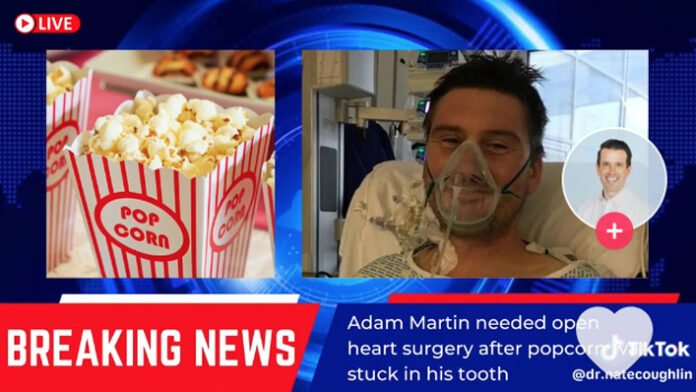In 2020, Adam Martin, a 41-year-old firefighter, experienced an unexpected and life-threatening medical ordeal that began with a seemingly innocuous incident: a popcorn kernel stuck in his tooth. This minor annoyance quickly escalated into a serious infection that ultimately required open-heart surgery to replace damaged valves. Martin’s story is a stark reminder of the potential dangers of dental neglect and the critical importance of seeking prompt medical attention for dental issues.
The Beginning of an Unlikely Ordeal
It all started one evening in late 2019. Adam Martin was enjoying a quiet night at home, relaxing after a demanding shift at the fire station. Like many of us, he decided to indulge in a popular snack—popcorn. Little did he know, this simple treat would soon lead to a harrowing medical crisis.
As he ate, a popcorn kernel became lodged between his teeth. Despite his best efforts to dislodge it using common household tools such as toothpicks, dental floss, and even a piece of metal wire, the kernel remained stubbornly stuck. Frustrated but not overly concerned, Martin decided to let it be, assuming it would eventually work its way out on its own.
The Escalation: From Dental Issue to Serious Infection
Days turned into weeks, and the popcorn kernel remained in place. During this time, Martin began to notice swelling and discomfort in his gums. These symptoms were accompanied by increasing pain, but as a busy firefighter and father, he prioritized his responsibilities over his own health. He continued to put off a visit to the dentist, thinking the problem would resolve itself.
Unfortunately, the situation worsened. The area around the kernel became severely infected, and Martin began to experience more alarming symptoms, including fatigue, fever, and chills. These are classic signs of a systemic infection, which occurs when bacteria enter the bloodstream and spread throughout the body. In Martin’s case, the bacteria likely originated from the infected gum and traveled through his bloodstream, causing a condition known as endocarditis.
@dr.natecoughlinPopcorn and no dentist nearly kills this man♬ original sound – dr.natecoughlin
Understanding Endocarditis
Endocarditis is an infection of the inner lining of the heart chambers and valves. It occurs when bacteria or other germs from another part of the body, such as the mouth, spread through the bloodstream and attach to damaged areas of the heart. If left untreated, endocarditis can damage or destroy the heart valves and can lead to life-threatening complications.
For Martin, the endocarditis infection severely damaged his heart valves, particularly the aortic and mitral valves. This damage impaired the heart’s ability to pump blood effectively, causing a dangerous decline in his overall health.
A Turn for the Worse: The Need for Open-Heart Surgery
As Martin’s condition deteriorated, he finally sought medical help. By this point, the infection had taken a serious toll on his body, and his doctors quickly realized the gravity of the situation. He was admitted to the hospital, where a series of tests confirmed the diagnosis of endocarditis and revealed the extensive damage to his heart valves.
The medical team determined that the only way to save Martin’s life was through open-heart surgery. The procedure would involve removing the damaged valves and replacing them with artificial ones. This type of surgery is incredibly complex and carries significant risks, but it was the only option to prevent further deterioration and potential death.
The Life-Saving Surgery
In early 2020, Adam Martin underwent the life-saving open-heart surgery. The operation was a success, but it was just the beginning of a long and challenging recovery process. Post-surgery, Martin faced weeks of hospitalization, followed by months of physical rehabilitation and regular medical check-ups to monitor his heart function and overall health.
Throughout this ordeal, Martin’s resilience and determination were evident. He drew strength from his family, friends, and fellow firefighters, who provided unwavering support during his recovery. Despite the immense physical and emotional challenges, Martin remained optimistic and committed to regaining his health.

